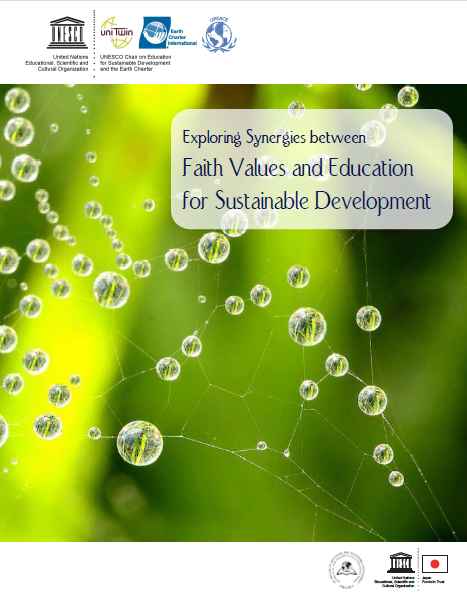The United Nations Educational, Scientific and Cultural Organization (UNESCO) recently released a new document entitled “Exploring Synergies between Faith Values and Education for Sustainable Development.” This collaboration with Earth Charter International and the University for Peace examines the relationship between sustainable development and faith values and places an emphasis on the role they play in creating a sustainable planet.
The paper presents 17 articles from the Abrahamic, Asian and Indigenous Traditions focusing on various roles, contributions and responses of faith groups towards the goal of sustainable development. Two articles were presented from the Islamic perspective; Sustainability in Islam by Zabariah Haji Matali and Sustainable Development in a Muslim Context by Dr. Muhammad Nouh.
Zabariah Haji Matali is the Chief Executive Officer of the Islamic Information Centre in Malaysia and has worked extensively in the ENGO sector in the county. Her previous post as General Manager at AZAM saw her promoting sustainable development from a business perspective. In her article she highlights eight guiding principles outlined in the Quran surrounding sustainability and goes into detail examining their importance. These are:
1) Adl (Justice) - governing human relationships and other living creatures;
2) Mizan (Balance) - governing not only human social and economic relationships but also the environment, especially in ensuring the equilibrium of nature, use of resources and life cycle of all species;
3) Wasat (Middleness) - choosing the middle path in economic planning, social conduct, scientific pursuits, ideological views, material, water and energy consumption;
4) Rahmah (Mercy) - governing all aspects of human relationships and treatment of all living animals, plants and insects including micro-organisms;
5) Amanah (Trustworthiness and custodianship) - Humankind is considered to be a trustee appointed by the Creator, for all earth’s assets;
6) Taharah (Spiritual purity and Physical cleanliness) - generating contented individuals through spiritual purity, conscious of the presence of his/her Creator, that would result in a balanced society, living in harmony with the environment; cleanliness that would generate a healthy society devoid of air and water pollution, as well as generating a clean economy devoid of usury and deceitful marketing techniques and business transactions;
7) Haq (Truthfulness and Rights) - Truthfulness in all dealings that recognizes the respective rights of others (humans, animals and plants)
8) Ilm Nafi’ (usefulness of knowledge and science) – Knowledge, whether theological, scientific or technological, must be beneficial to others (individuals and society) including future generations.
Zabariah concludes with a call to action, especially when it comes to governing access to water for current and future generations as it is an issue with a profound impact in the Islamic world.
Dr. Muhammad Nouh is currently a faculty member at the Islamic Sciences International University in Jordan. He previously served in the Jordan Civil Defense as Mufti and is a Friday preacher and Arbitrator in the Jordanian courts. In his article he approaches sustainable development from a multi-dimensional process that puts economic and social development on one side with the environment on the other. Maintaining this delicate balance involves five components which he elaborates within his article. They are:
1) Honoring human beings
2) Comprehensiveness of the Environment
3) Balance
4) Limited Resources
5) Environmental Protection
He closes by providing context within Islamic jurisprudence concerning sustainable development with the overarching theme of “Do no harm.” This means not harming access to vital resources such as water, through pollution, contamination or overuse that would negatively affect both humans and animals alike.
UNESCO is the English acronym for the United Nations Educational, Scientific and Cultural Organization. Its constitution was adopted by the London Conference in November 1945, and entered into effect on the 4th of November 1946 when 20 states had deposited instruments of acceptance. Canada was one of these 20 original Member States, and has been an active member ever since. UNESCO’s main objective is to contribute to peace and security in the world by promoting collaboration among nations through education, science, culture and communication and information.
Photo Credit from: Earth Charter Initiative


